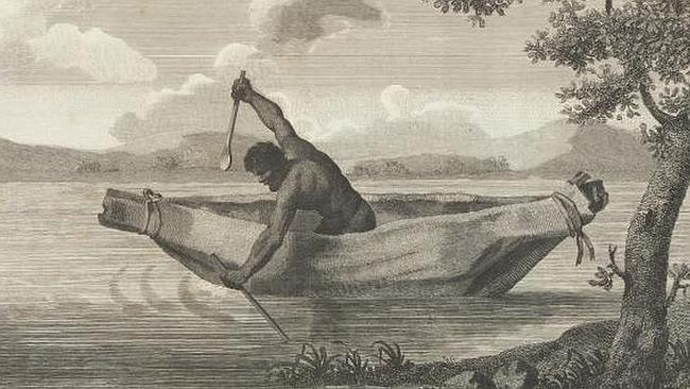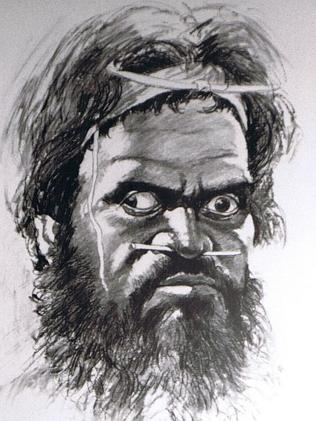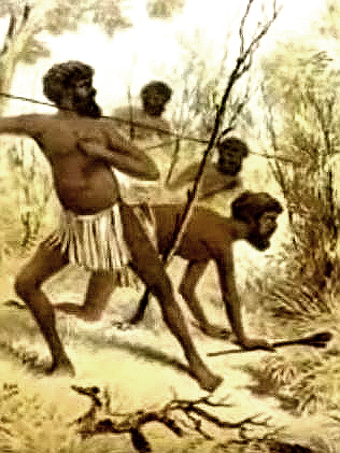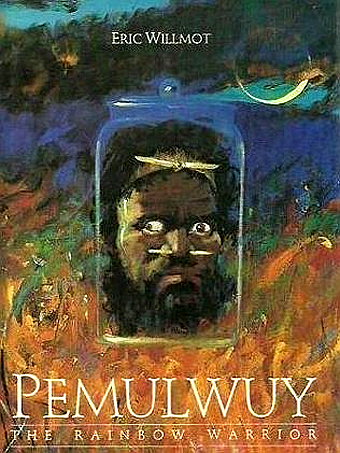Despite the efforts of Prince William, the skull of the 'rainbow warrior' remains at large

(Picture: State Library of Victoria)
news.com.au 12 September 2-15
He's one of the most iconic cultural figures in Australia and the fate of his posthumous remains is the oldest murder mystery in our country's history.
The disappearance of the severed head of indigenous warrior Pemulwuy has developed into such a captivating issue that Prince William has both thrown their weight behind the efforts to repatriate the lost skull.
So who was Pemulwuy?
Thought to be born around 1750, he was Australia's first ever resistance fighter and waged a successful guerilla warfare along the Cumberland Plains of New South Wales against the newly arrived British colonists.

Pemulwuy. Pic: Australian Stockman's Hall of Fame and Outback Heritage Centre
Such was his fighting prowess that "he was believed by both the colonists and his own people to have superpowers," Australian historian David Hunt told news.com.au
According to accounts, he would emerge from bushland and run through a wall of bullets to wreak havoc on the settler's emerging colonies. When his body finally came to rest, settlers pulled eight ounces of lead from his body from the accumulated bullets.
The colourful garb worn by the clubfooted warrior earned him the nickname "rainbow warrior".
"He was such a charismatic fighter that he actually recruited a number of white convicts to fight with him," Hunt says.
In the 1797 battle of Parramatta, Pemulwuy led a hundred aboriginal warriors in an attack on a government farm at Toongabbie. The following day the settlers and troops followed them back to Parramatta and killed five of the indigenous fighters. As for Pemulwuy, he was shot seven times and captured by the new arrivals.
The colonists had such respect for him that they tied him to a hospital bed and waited for him to recover from his injuries - they wanted to hang him with dignity. "They admired him immensely," Hunt says.
However they didn't get the chance. Despite being weighed down by a leg iron, Pemulwuy added to his mythical reputation by breaking free from hospital and escaping into the bush.
In November of 1801 Governor Philip Gidley King issued a reward of 20 gallons of rum and two suits of clothing for anyone who brought Pemulwuy's body to him - dead or alive.
The enticing bounty was too much for Henry Hacking, "one of the more noted alcoholics in the colony at the time," Hunt says. Hacking went on to fatally shoot the famed warrior in order to secure the generous supply of grog.
Pemulwuy's head was later preserved in spirits and shipped to botanist Sir Joseph Banks in England. Along with the head was a note from Governor King which read; "although a terrible pest to the colony, he was a brave and independent character."
And so began the mystery of where Pemulwuy's skull came to rest.

Eric Willmot’s Pemulwuy. Source: Supplied
|

Pemulwuy led attacks on British colonists.
(Source: First Australians Source: YouTube) |
Pemulwuy was commemorated at the National Museum earlier in the year but his recognition as a figure of great cultural importance has been a long time coming. “Because he was an outlaw, he got bad press,” says Hunt. “It’s only in the last 20 years he’s been seen as such an important figure in Australia’s history.”
The culture of indigenous Australians is well known to place a strong significance on the connection between the land and the souls of deceased ancestors. Thus the repatriation of Pemulwuy’s skull is a passionate issue for many and has been accompanied by a growing number of calls to locate the head and bring it back to Australian soil.
The campaign has been bolstered by some powerful figures in recent years. During a 2010 trip to Sydney, Prince William spoke to aboriginal elders and expressed his desire to help in the search and repatriation efforts.
Since that trip Liberal frontbencher Christopher Pyne has written to him in a continued effort to lobby the royal family to assist in the search. Pyne has also brought the issue up on the floor of parliament on a number of occasions. *He believes Pemulwuy’s military resistance to white settlement is something all Australians should celebrate and it remains an issue of interest on his personal website.
Despite the efforts of the Education Minister and the attention brought to the issue by Prince William, there has been little change in the known status of the skull over the years.
According to David Hunt, Joseph Banks passed on Pemulwuy’s head to a well known anthropologist names Joseph Hunter. From there it is widely suspected to have found a home at the British Museum of Natural History.
“Museums like that have millions and millions of specimens,” says Hunt. “It may not have been labelled as a skull of an indigenous man from New Holland.”
If the skull is ever located it should be rather easy to identify due to severe trauma Pemulwuy suffered in a well known battle with a bushranger named Black Caesar.
Whether that day comes, remains a mystery but Hunt thinks it’s certainly not out of the question. “It’s entirely possible that it’s just sitting in a drawer or shelve somewhere,” Hunt says.
* This must be a media spin, as Christopher Pyne was the minister who had the school history books rewritten, emphasising on history since settlement and limiting the long bloody massacres and frontier wars.

